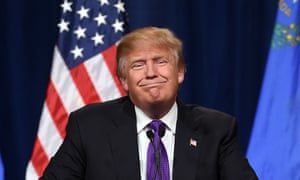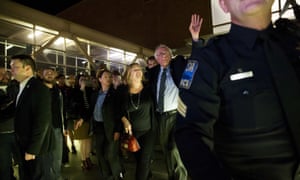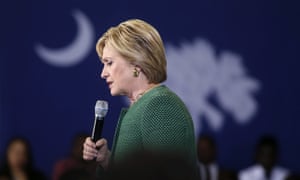The Harvard moral philosopher and author of the highly acclaimed What Money Can’t Buy Michael Sandel in The Guardian examines the febrile mood of his nation

‘Donald Trump has defied conventional wisdom by challenging the complacencies of the political establishment.’ Photograph: Ethan Miller/Getty Images
The tumultuous early months of the US presidential primaries reflect a populist moment in American politics. Among Democrats, Bernie Sanders, the only self-proclaimed socialist in the Senate, has shown surprising strength against former secretary of state Hillary Clinton, who was expected to win the Democratic nomination virtually unopposed. Among Republicans, Donald Trump, the billionaire businessman and television personality, has vaulted to front-runner status over a crowded field of politicians, including former Florida governor Jeb Bush, the brother of former President George W Bush. Despite having raised more than $100m in campaign contributions, Jeb Bush failed to connect with voters and ended his candidacy.
In different ways, both Sanders and Trump have defied conventional wisdom by challenging the complacencies of the political establishment. Although Clinton remains the front runner for the Democratic nomination, polls show her lead over Sanders among Democratic voters has shrunk from 25 percentage points two months ago to only six percentage points today. Clinton’s shrinking lead has partly to do with voters’ doubts about her honesty and trustworthiness. Many voters find Bernie’s gruff, plain-spoken manner refreshingly authentic, in contrast to Hillary’s cautious, calculating style.
Young people are especially attracted to the 74-year-old Sanders, who draws large, enthusiastic crowds. In the first three primary and caucus contests – in Iowa, New Hampshire and Nevada – more than 80% of voters under 30 voted for Sanders.
The two candidates differ in substance as well as style. Sanders has risen from obscurity on a platform of reducing inequality, breaking up the big banks and challenging the power of money in politics. He argues that Clinton, like other Democratic politicians in recent years, is too close to Wall Street to stand up to the banks. Her campaign has received $15m from the financial industry, while his is funded by small donations from ordinary Americans. She also benefited personally from corporate largesse, earning more than $20m from paid speeches after leaving her job as secretary of state. The investment bank Goldman Sachs paid her $675,000 for three speeches.
Sanders does not think the regulatory reforms that followed the financial crisis of 2008 went far enough. He wants to break up the big banks and to separate commercial banking from high-risk investment banking. He would levy a tax on financial speculation and use the revenue to make public colleges and universities tuition-free. Sanders also wants to go beyond President Obama’s healthcare reform, which left private insurance companies in place, and create a universal, single-payer health system. Clinton argues that these proposals are unrealistic and favours more modest, incremental reforms. She claims that Sanders’s emphasis on economic inequality and the power of money in politics makes him a “single-issue candidate”. Clinton cites her extensive foreign policy experience as evidence that she is better qualified to lead America in the world. Sanders replies that good judgment matters more than experience. He voted against allowing the Bush administration to go to war with Iraq, while she voted in favour.
The tumultuous early months of the US presidential primaries reflect a populist moment in American politics. Among Democrats, Bernie Sanders, the only self-proclaimed socialist in the Senate, has shown surprising strength against former secretary of state Hillary Clinton, who was expected to win the Democratic nomination virtually unopposed. Among Republicans, Donald Trump, the billionaire businessman and television personality, has vaulted to front-runner status over a crowded field of politicians, including former Florida governor Jeb Bush, the brother of former President George W Bush. Despite having raised more than $100m in campaign contributions, Jeb Bush failed to connect with voters and ended his candidacy.
In different ways, both Sanders and Trump have defied conventional wisdom by challenging the complacencies of the political establishment. Although Clinton remains the front runner for the Democratic nomination, polls show her lead over Sanders among Democratic voters has shrunk from 25 percentage points two months ago to only six percentage points today. Clinton’s shrinking lead has partly to do with voters’ doubts about her honesty and trustworthiness. Many voters find Bernie’s gruff, plain-spoken manner refreshingly authentic, in contrast to Hillary’s cautious, calculating style.
Young people are especially attracted to the 74-year-old Sanders, who draws large, enthusiastic crowds. In the first three primary and caucus contests – in Iowa, New Hampshire and Nevada – more than 80% of voters under 30 voted for Sanders.
The two candidates differ in substance as well as style. Sanders has risen from obscurity on a platform of reducing inequality, breaking up the big banks and challenging the power of money in politics. He argues that Clinton, like other Democratic politicians in recent years, is too close to Wall Street to stand up to the banks. Her campaign has received $15m from the financial industry, while his is funded by small donations from ordinary Americans. She also benefited personally from corporate largesse, earning more than $20m from paid speeches after leaving her job as secretary of state. The investment bank Goldman Sachs paid her $675,000 for three speeches.
Sanders does not think the regulatory reforms that followed the financial crisis of 2008 went far enough. He wants to break up the big banks and to separate commercial banking from high-risk investment banking. He would levy a tax on financial speculation and use the revenue to make public colleges and universities tuition-free. Sanders also wants to go beyond President Obama’s healthcare reform, which left private insurance companies in place, and create a universal, single-payer health system. Clinton argues that these proposals are unrealistic and favours more modest, incremental reforms. She claims that Sanders’s emphasis on economic inequality and the power of money in politics makes him a “single-issue candidate”. Clinton cites her extensive foreign policy experience as evidence that she is better qualified to lead America in the world. Sanders replies that good judgment matters more than experience. He voted against allowing the Bush administration to go to war with Iraq, while she voted in favour.

Democratic hopeful Bernie Sanders and his wife, Jane, on the stump in Oklahoma. Photograph: Jacquelyn Martin/AP
The surprising success of the Sanders campaign reflects frustration with the deepening inequality of recent decades and the failure of the Democratic party to address it. Income inequality has reached levels not seen since the 1920s. Most of the economic growth of recent years has flowed to those at the top. The wealthiest one-tenth of 1% (0.1%) now own as much wealth as the bottom 90% combined.
This concentration of income and wealth has made itself felt in politics. The deregulation of the financial industry that set the stage for the financial crisis took place in the late 1990s, during the presidency of Bill Clinton. When Barack Obama took office in the midst of the financial crisis, he appointed economic advisers who had promoted the deregulation of Wall Street during the Clinton years. Heeding their advice, he supported the taxpayer bailout of banks and investment firms while demanding little in return – no break-up of the banks, no separation of commercial and investment banking, no meaningful curbs on executive pay and bonuses, and little help for homeowners unable to afford mortgage payments on houses whose value had collapsed.
Meanwhile, the US Supreme Court struck down restrictions on corporate spending on political campaigns, arguing that spending unlimited amounts of money to make one’s views known was protected by the right of freedom of speech. Big money could now dominate politics without restraint. An analysis by the New York Times found that, in the early months of the current presidential campaign, about half of all the money donated to Democratic and Republican candidates came from just 158 wealthy families.
Mounting anger and frustration with a political system unaccountable to ordinary Americans has also fuelled the candidacy of Donald Trump. The populist moment in American politics finds expression on the right as well as the left. Like many European populists of the right, Trump has seized on the issue of immigration. He would deport the 12 million immigrants who reside in the US without legal permission. To prevent others from entering, he promises to build a wall along the 2,000-mile US-Mexico border. And, much to the delight of his campaign audiences, he declares he will make Mexico pay for the wall.
Trump’s tough stand on immigration appeals to working-class voters who fear that their jobs and wages are threatened by immigrants. But his appeal runs deeper. His hard line on immigration is part of a larger promise “to make America great again”. He rails against America’s trade deficit with China, against Isis terrorists who “chop off people’s heads”, against a “disastrous” deal with Iran to end sanctions in exchange for limits on its nuclear programme. Wherever he looks, Trump sees the failure of American power and will. “We don’t win any more,” he complains. His campaign is fundamentally about reversing American disempowerment. This is why Trump appeals especially to working-class men who feel the economy and the culture have left them behind. “When I’m president,” he boasts, “we will win so much you’ll get tired of winning.”
Despite their ideological differences, Sanders and Trump are tapping into similar sources of discontent. Both speak to Americans’ sense of disempowerment in the face of big money and unaccountable power. And both are critical of mainstream politicians, Democrats and Republicans, who have, over the last three decades, become captive beneficiaries of the system. Unlike their opponents, both Sanders and Trump have refused to accept the support of so-called “Super Pacs”, funding organisations that can raise and spend unlimited amounts of money on behalf of candidates, provided the spending is not directly controlled by the campaign. Their alternatives to “Super Pacs” differ, of course: Sanders has raised millions of dollars online in small contributions (averaging $27 per donation), while Trump, a billionaire, is funding his own campaign. In proclaiming the virtue of paying for his own campaign, Trump speaks bluntly about the corrupting effect of the current system of campaign finance, which effectively permits big corporations and wealthy individuals to buy influence with politicians. (He freely admits that, as a businessman, he, too, lavished campaign contributions on politicians in hope of future favours.)
On several other issues, Trump also has more in common with Sanders than with his fellow Republicans. He has heaped scorn on wealthy hedge fund managers who, thanks to a tax loophole, pay a lower rate of tax on their earnings than their secretaries pay. In language more likely to win applause at an Occupy Wall Street rally than at a Republican convention, Trump declared: “The hedge fund guys didn’t build this country. These are guys that shift paper around and they get lucky… These guys are getting away with murder. I want to lower the rates for the middle class.” Trump has also criticised free trade agreements that lead to the loss of American jobs to low-wage countries. Like Sanders, he opposes the TPP (Trans-Pacific Partnership), a pending trade deal among the US, Japan and 10 other nations, negotiated by the Obama administration and supported by Republicans in Congress. (Under pressure from Sanders’s challenge, Clinton broke with the Obama administration and now opposes the trade deal, despite having supported it while in office.)

Hillary Clinton, the Democratic front runner, is coming under intense pressure from Bernie Sanders. Photograph: Gerald Herbert/AP
In perhaps his most brazen break with the Republican party establishment, Trump has denounced the Iraq war as “a disaster”. During a debate in South Carolina, a state with strong military traditions, Trump declared that President George W Bush lied about Saddam Hussein possessing weapons of mass destruction, as a pretext for going to war. When Jeb Bush claimed that his brother had “kept the country safe”, Trump denied it, reminding the audience that the 9/11 attack on the World Trade Center occurred during Bush’s presidency. Despite this apostasy on the legacy of George W Bush and the Iraq war, Trump won the South Carolina primary by a comfortable margin.
The unexpected resonance of the Sanders and Trump campaigns does not represent a decisive turning of American voters towards the left or towards the right. It represents a populist protest against a neoliberal economic order embraced by the establishment wings of both parties, which bestows lavish rewards upon those at the top and makes life precarious for everyone else.
The rise of Sanders and Trump is less about ideology than about anxiety that the American Dream is slipping away. This is what Sanders means when he says that the system is rigged against ordinary Americans. And this is what Trump means when he says that America doesn’t win any more. Both give expression to a widespread sense that Americans are losing control of the forces that govern their lives.
The American Dream has never been about reducing inequalities of income and wealth. It has been about enabling people to rise and giving one’s children the chance to rise even further. This is why Americans have traditionally worried less about inequality than Europeans do. We may have greater disparities of income and wealth than do the welfare states of Europe, we would tell ourselves, but here, we are not consigned to the class of our birth. Mobility, not equality, is the measure of our freedom. In recent decades, however, this comforting self-image has begun to ring hollow. The long-standing faith that those who “work hard and play by the rules” will get ahead no longer fits the lived experience of working-class and middle-class Americans. The growing inequality of recent decades has not been offset by opportunities to rise. To the contrary, it has brought a hardening of economic mobility.
The US has less mobility than most major European countries. Forty-two per cent of American men born in the bottom fifth of the income scale remain stuck there as adults (compared with 25% in Denmark and 30% in Britain). Only 8% of American men rise from the bottom fifth to the top. Studies of mobility from one generation to the next tell a similar story. Class mobility is greater in Denmark, Norway, Canada, Sweden, Germany and France than in the US. The American Dream is alive and well and living in Denmark.
If the promise of upward mobility is no longer a realistic way to contend with inequalities of income and wealth, Americans may need to reconsider the place of equality in the American Dream. Whether this populist moment will prompt such rethinking remains to be seen.